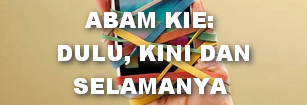The food we eat should bring us both health and happiness. This is the underlying meaning of “you are what you eat”. In Malaysia, eating is a pleasurable and social activity. What we consume largely shapes our physical self and overall health.
More and more Malaysians are becoming overweight, a condition that did not simply occur overnight. Sustained unhealthy eating habits over time, coupled with a lack of exercise, have contributed to this situation.
Malaysians love to eat all day long. We find every excuse to eat. Eating has become an experience, and the satisfaction of this desire has increasingly become an adventure of the self. We seem to be eating non-stop, sustaining a bad habit.
Are we making the right choices? For breakfast, ask any Malaysian whether they prefer roti canai or nasi lemak over a bowl of salad, and it is obvious what they will choose. For drinks, ask them if they want teh tarik or teh kosong, and the choice is again obvious. For desserts, it is the same – Malaysians would readily choose cheesecake over a piece of fruit.
Here are some specific instances where we overindulge in eating, which may sound all too familiar.
> At "eat-all-you-can" buffets: Malaysians insist on wanting value for money – so for that meal, we ignore any mantra about "eating right". There is so much food to eat and a plethora of variety; there are just too many options. So we just eat and eat, trying out the wide variety of dishes served. The "eat-all-you-can" is indeed a smart marketing tag and very effective too. And that’s exactly what we will do – to our detriment.
> At official Open Houses (whether it’s Chinese New Year, Hari Raya, or Deepavali): We indulge as if there was no tomorrow. We take more satay sticks than we usually do as we are afraid there might not be any left after a while. Friends will tell you “Try this and that”, and you oblige.
> At a durian party: Especially when the Musang King variety is served, our stomachs become limitless. We find ourselves overindulging; our daily calorie intake is completely forgotten. We comfort ourselves by saying, "How often do I get a chance to attend such parties?"
> 24/7 access to food: Whether it is the 24-hour mamak shop or a fridge ready to satisfy any craving, including a midnight snack.
> Unconsciously eating supersized portions: For instance, at the banana leaf restaurant we tend to tambah nasi and then ask for teh tarik with less sugar. At buffets, we don’t take smaller portions with each round but continue to take portions that we usually take when we have an ordinary meal.
> Mindless eating: You are already so full and yet you want to do justice to the food. For instance, at a Chinese wedding dinner, the second last dish before dessert is served is usually fried noodles – many can be seen eating although they are completely full. At home, we are so absorbed in the movie we are watching that we don’t realise we have finished the whole bag of potato chips!
> Peer pressure: Relatives, friends, and even your spouse encourage you to eat more. They would say “Never mind lah, eat and enjoy, you can always diet another day” (and "another day" seldom comes). So, since our friends and family overeat, we also do the same.
Do you notice that even if we are full to the brim and a fresh dish is being served, we have no hesitation to try it – our stomachs seem limitless.> During Ramadan: My Muslim friends tell me that it is challenging not to overeat after breaking fast. They gorge on food because they feel that they deserve it and have earned it by fasting all day long.> At a free-flowing beer party: Peer pressure forces you to drink much more beer than you usually do. You try to be social by indulging in what your friends are having. Sometimes the phrase "one for the road" loses its meaning as you are trying to keep up with the best drinker in town.
We all overeat on special occasions, and that is perfectly OK and normal. However, making it a habit is where the problem lies.
The way forward
A bit of discipline can do wonders:
> Don’t eat between meals.
> Keep to the same meal times as far as possible.
> Eat the right food in the right quantities: Minimise eating processed, salty, and sugary food.
> Choose healthier drinks: When we are thirsty, why opt for a carbonated drink, sweetened coffee/tea, or a glass of syrup water when a plain glass of water will do?
Some organisations, such as Gurdwaras (Sikh temples), now offer cha without sugar alongside the normal sweetened cha. And some, like me, mix both.
The key word is discipline. We lack the willpower when it comes to food. So the next time we open our mouths to eat, think again. Let's change our ways for a healthier Malaysia.








.png)

0 Comments